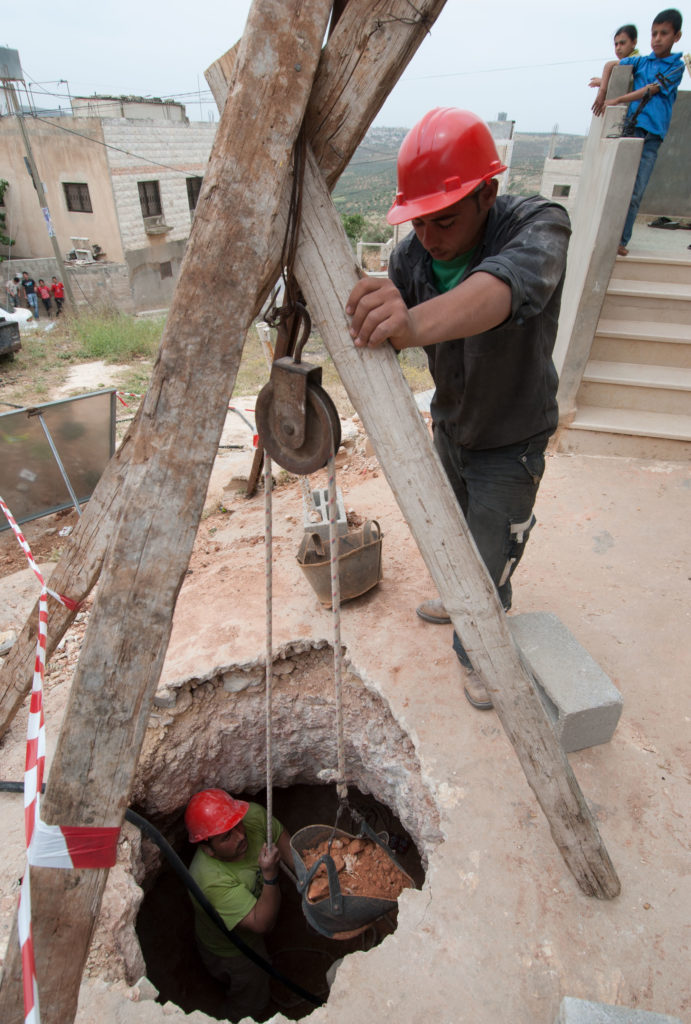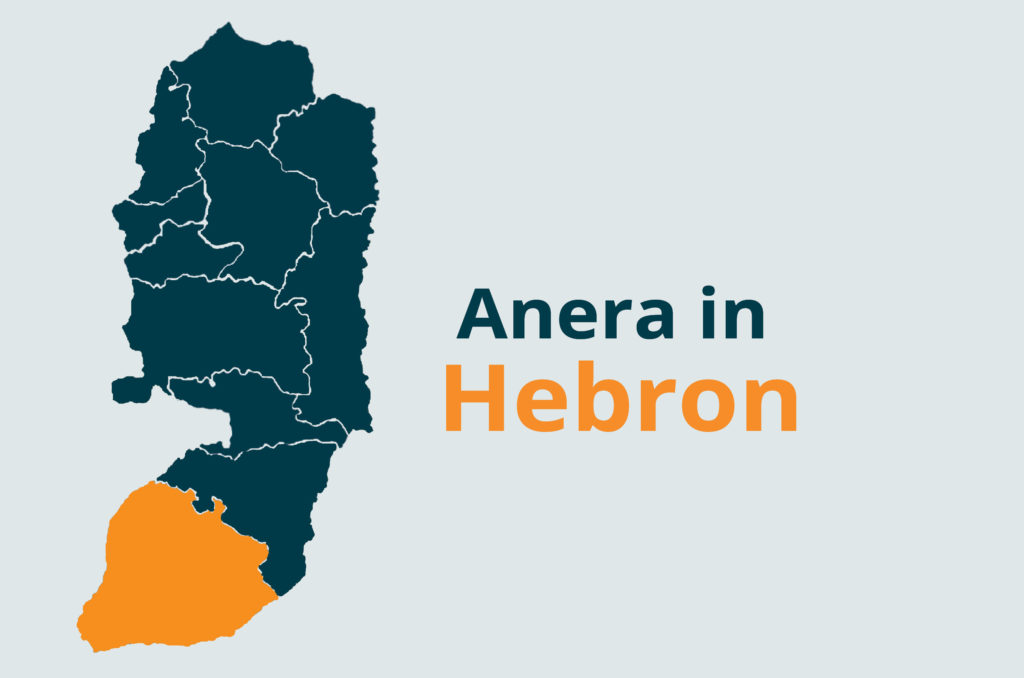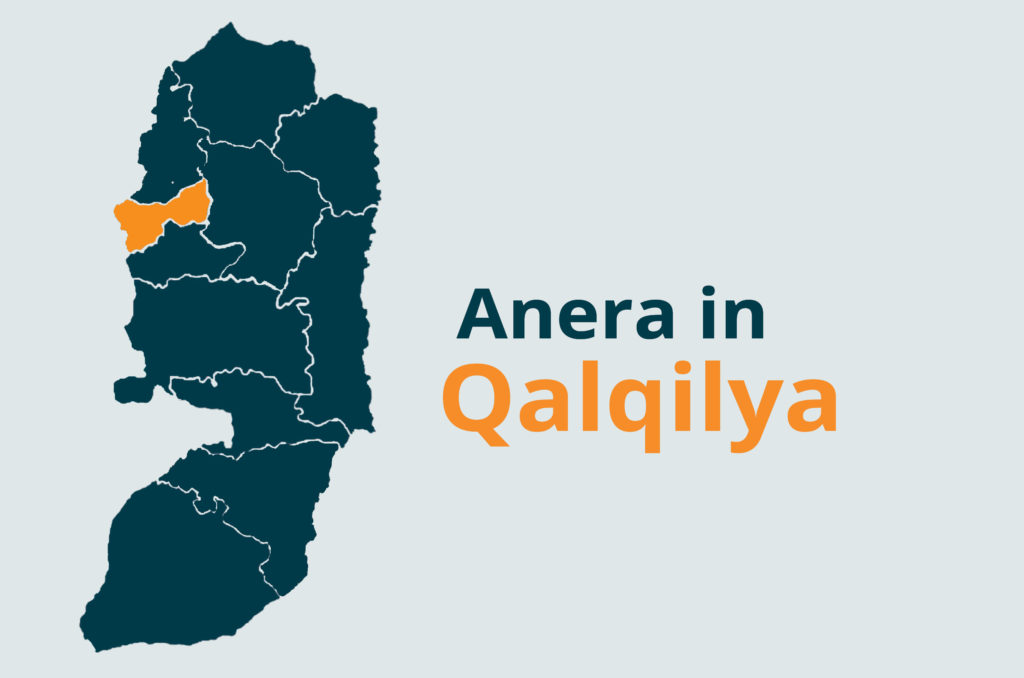Jan, 2025
Home to the ancient city of Tubas, in the mountains, this region also encompasses rich agricultural lands in the northern part of the fertile Jordan Valley.
Tubas Governorate | محافظة طوباس
The Tubas Governorate is a largely rural region in the northeast of the West Bank in Palestine. The largest city is also called Tubas, with a history going back thousands of years.
Most of this agricultural governorate lies within the Jordan Valley and falls within Area C, which means much of the land is not available for Palestinian use. On the lands the can access, Palestinian farmers grow a range of crops, particularly vegetables like tomatoes, cucumbers, bell peppers, and eggplants, as well as fruits like watermelon, citrus, dates and avocados. Water is scarce and farmers must often purchase it for irrigation. The western corner, including the ancient city of Tubas and many of the larger towns, are geographically elevated, high above the valley. The Far’a Refugee Camp is also located in the governorate.
Anera has worked in Tubas for decades to improve opportunities and quality of life for residents of this remote area of the West Bank.
From 2005 to 2019, Anera implemented a series of USAID-funded infrastructure programs, known as Emergency Water and Sanitation and Other Infrastructure I and II and the Palestinian Community Infrastructure Development. Through these projects and others, Anera improved and rehabilitated local infrastructure in vulnerable communities across Palestine.
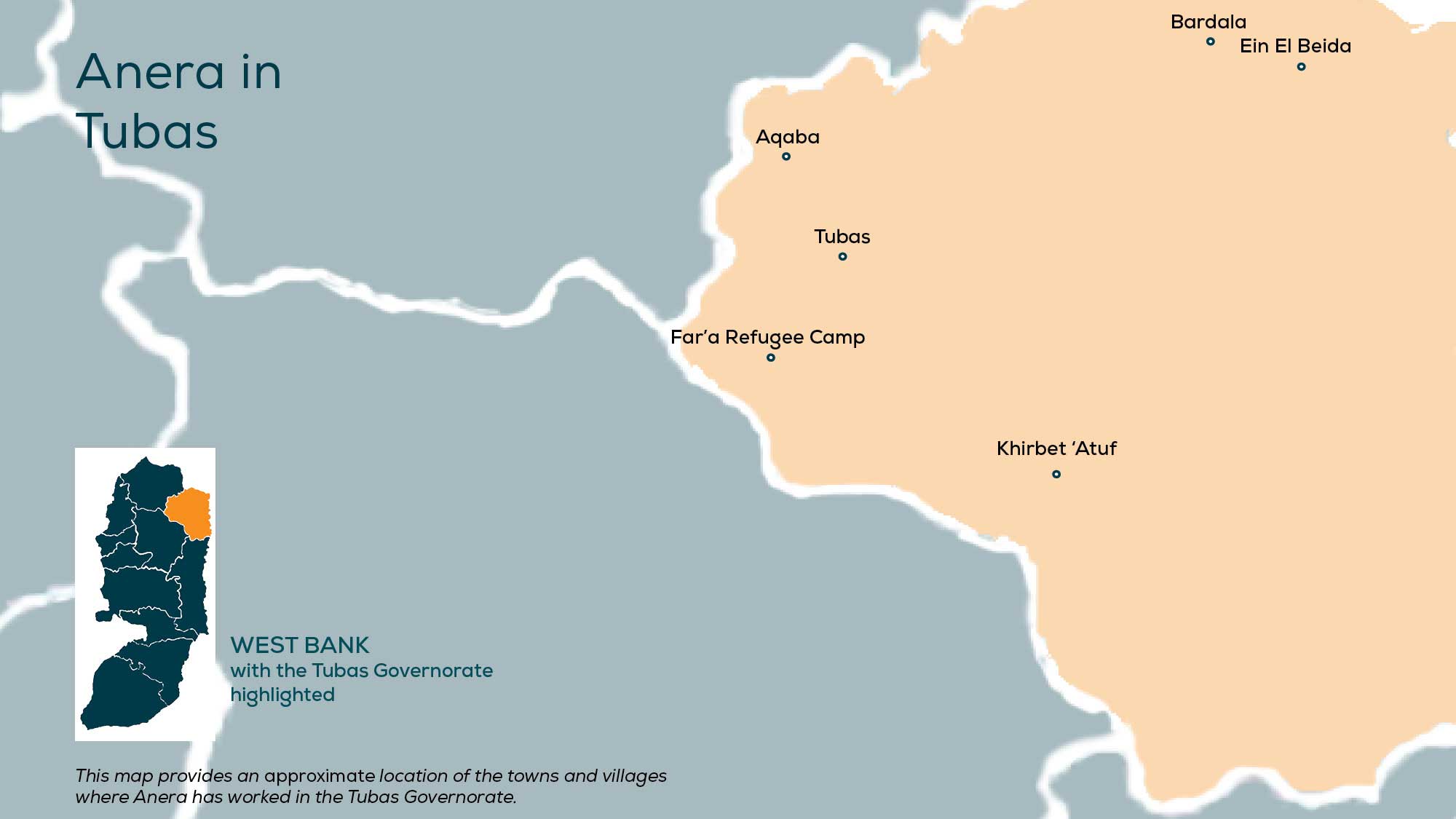

Education
A proper learning environment is essential for early childhood development. Some years ago, there were only two government preschools in the entire West Bank. Today there are over 100 public preschools, and Anera has helped develop many of them, including in Tubas Governorate. As elsewhere, in Tubas we have rehabilitated aging school buildings and playgrounds, and trained local teachers.
Anera’s early childhood development program is built on a comprehensive and holistic vision to provide the best learning environment for children in safe and colorful settings with child-appropriate learning materials and furnishings, sanitary facilities and playgrounds.
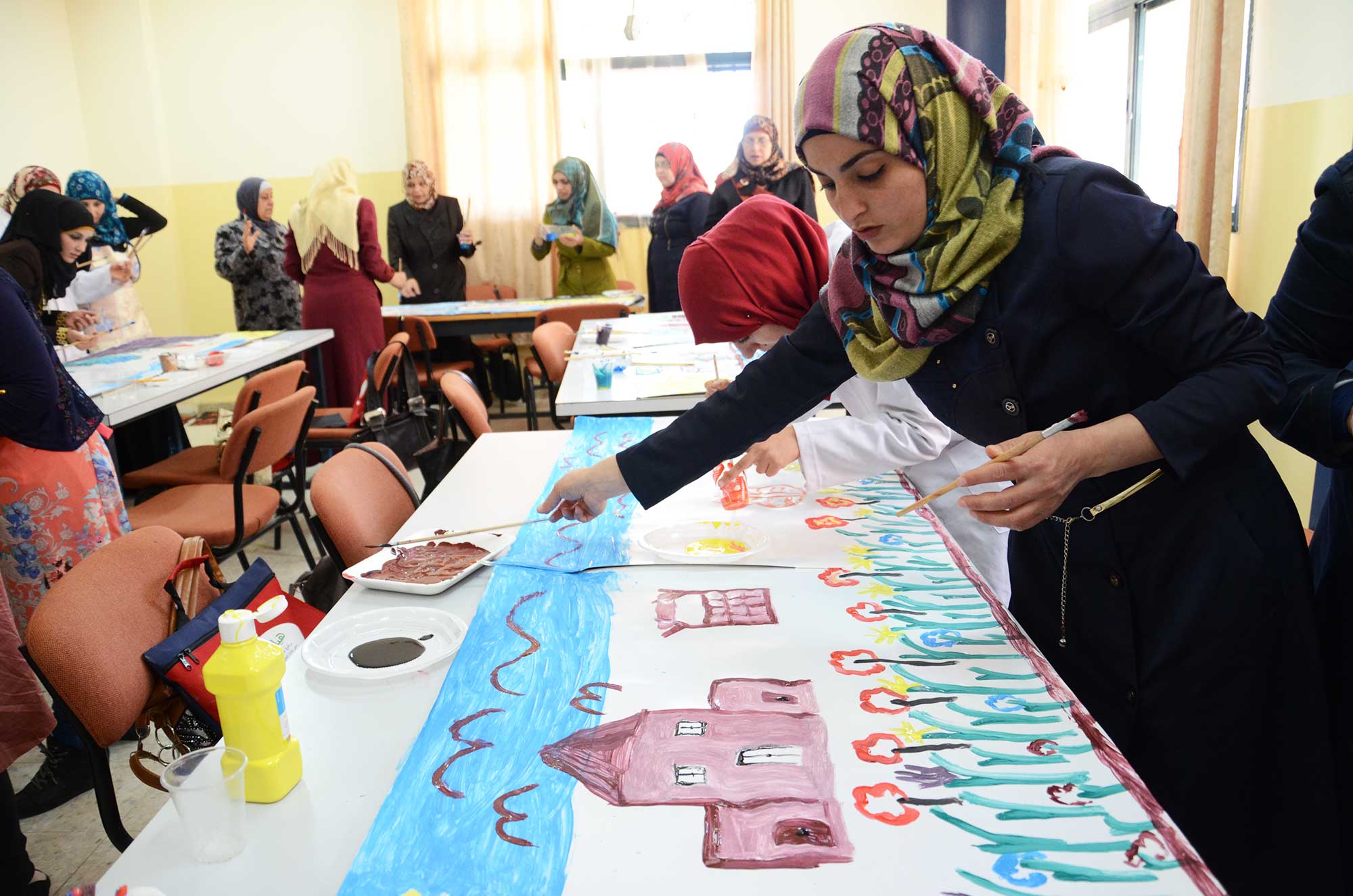

In 2008, Anera build a new public school for girls in the Palestinian village of Bardala, with a capacity for 420 students, a dozen classrooms, a library, computer and science labs, and a playground. Previously, girls often dropped out before high school.
The head of the school said that before Anera built the new school building, “we used to notice a big drop in girls’ enrollment after the eighth grade. Many families prevented their girls from going to the coed high school in the village, which is religiously conservative.”


“I have always been proud of my girls who are thirsty to learn and are able to score high grades on their exams despite having to study under very hard conditions. With this new building, I know that they will be able to accomplish much more. Also, parents are happy because their girls don’t have to travel to Tubas or Jericho to seek higher-level education.”
In 2009, with USAID funding we completed modernization of the Tubas Girls’ School, upgrading the school’s water and sanitation facilities to provide students and teachers with hygienic facilities and safe drinking water. Aisha, a twelfth grade student at the time, expressed her relief at having the renovations:
“The old bathroom disgusted me. I preferred waiting until school ended to go home and use the bathroom there.”
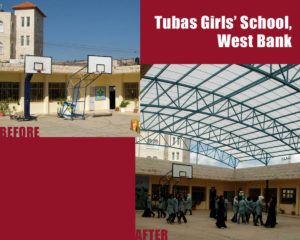

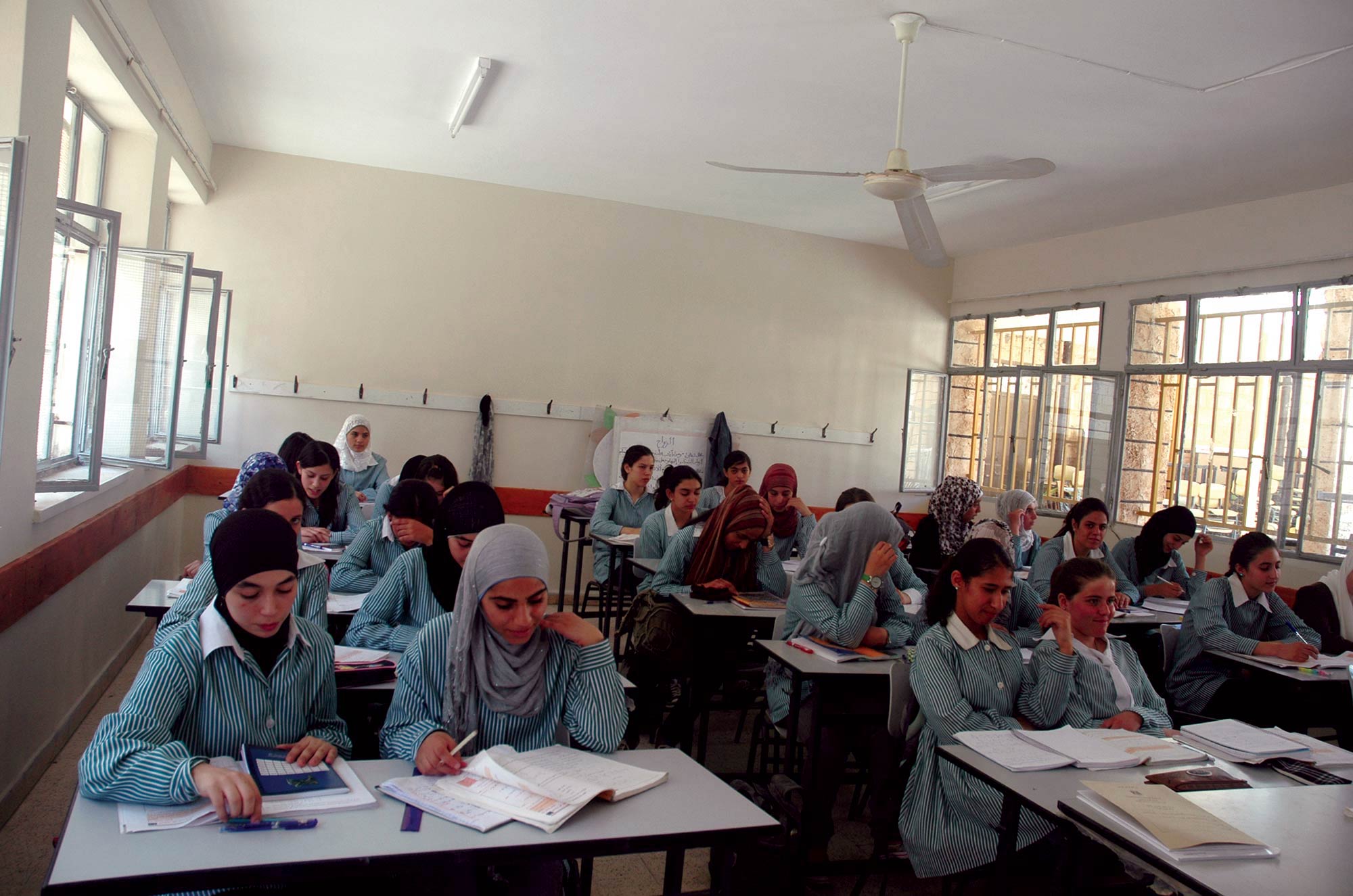

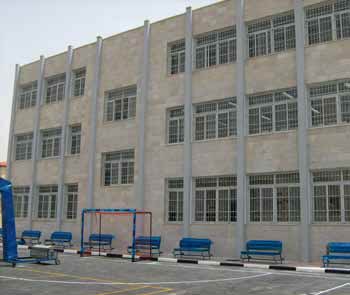

In 2010, Anera also completed a six classroom addition at the Mustafa Abu Al Khaizaran Basic Boys' School in Tubas.
Anera has also supported the Tubas Charitable Society — an organization dedicated to improving children’s education in the region, providing legal and social services to women and children, and promoting economic empowerment — by renovating their preschool.
In more recent years, Anera continues to train and mentor teachers in the Tubas region. We have also worked with local partners to institute music and movement activities in six preschools in Tubas.
A number of preschools in Tubas Governorate participate in Anera’s early childhood development program, including the Aqaba Charitable Society and Tubas Charitable Society preschools, the Children of Al Far’a Refugee Camp preschool, and the Bardala, Ein El Beida, and Al Aqaba preschools.
In the last decade, we have also provided schools in the region with laptop computers and LCD projectors to enhance e-learning opportunities for students and enabling schools to give lectures electronically to students.
Agriculture
Over the years, Anera has supported farmers in various ways in this heavily agricultural region. In 1992 for instance, Anera provided the Tubas Cooperative with farming equipment and a tractor.
In 2012, Anera launched a project to contribute to the pool of knowledge shared by local farmers on how best to maximize land utilization in Tubas (along with Hebron and Jerusalem). The program linked researchers from the NGO sector and academic institutions focused on agricultural issues in Palestine with local farmers on the ground to address the challenges of increased food security through improved land utilization. A total of 90 farmers participated in the program. We worked in partnership with the Palestinian Ministry of Agriculture and several Palestinian NGOs with considerable experience in agriculture, particularly in inter-cropping and land reclamation to test and identify best practices in local agriculture and systems for effective knowledge sharing among small Palestinian farmers.
Improving Health Care in Tubas
In 2014, Anera completed construction of a new health clinic in Tubas.
With funding from USAID, in 2012 and 2013 Anera expanded the medical clinic in Aqaba and constructed new clinics in Atuf and the city of Tubas. The new clinic in Tubas became the central clinic for the governorate, serving a community of 60,000 people.
In Aqaba, Anera renovated the original clinic and built a second floor, adding examination, vaccination and medical training rooms to host workshops and informational sessions for local residents and health care professionals. Some 12,000 people from the village and surrounding communities now have access to a larger clinic with additional health care services.


“Since we opened the clinic, we have seen an increase in the number of patients treated. They no longer have to go to other farther-away clinics in different areas to seek basic health care,” said physician Mamoun Zyoud.
And the clinic in Atuf offers general clinic services, vaccinations, maternal and child health care, family planning and other services to the local community.
Water and Sanitation in Tubas
In 2012, Anera completed several years of work installing rainwater drainage systems in the city of Tubas, which was badly in need of improved drainage infrastructure. During the rainy winter months, streets flooded easily, making life miserable for residents.
The small city is located in a valley and water from surrounding hillsides collected there. The busy main road would flood with as much as a foot of stagnant water following heavy rains and would remain for days or even weeks. The flooding significantly impacted the many local businesses along the road as well as the local university.


“It was extremely challenging getting to the University, sometimes impossible,” said Randa, then a student at Al-Quds Open University in Tubas. “Cars driving by would splash dirty water on us, and sometimes we would slip and get completely soaked and miss classes.”
The university reports that student attendance has improved since the installation of the drainage system.
The new rainwater drainage system allows rainwater to drain safely into nearby collection areas, or wadies, which will recharge the underground aquifers.
Over the years, Anera has also excavated scores of cisterns near family homes in Tubas and across the West Bank, like this one in Aqaba.
